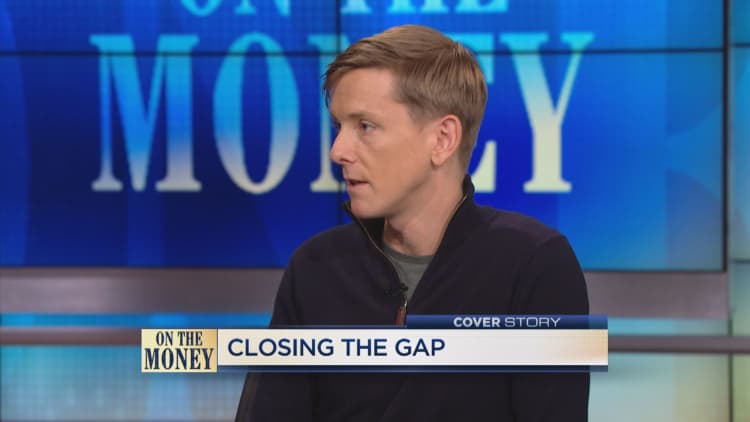
Would a $500 monthly check, no strings attached, help more working families succeed? It's a bold idea that's gaining proponents in Silicon Valley — and one that the co-founder of Facebook is pushing hard.
"If you're working hard trying to make ends meet, you shouldn't live in poverty in America," Chris Hughes told CNBC in an interview. "It sounds so simple but unfortunately it's not true."
While similar to Universal Basic Income, which would provide a higher monthly check (say, $1,000) to everyone, Hughes said this proposed "Guaranteed Income" differs in that it would give a smaller amount to every working American making less than $50,000 a year and thus could help close the income inequality gap.
"What's happened in reality is that jobs have become more and more unstable and half of Americans don't have $400 in case of emergency," Hughes explained.
He recently outlined his plan to change that in his new book, "Fair Shot: Rethinking Inequality And How We Earn." Hughes argued that America's wealthiest, or the so-called "One Percent" could pay for the plan.
At the end of 2017, the Federal Reserve found the top one percent of Americans hold 39 percent of the country's wealth.
"We have to be more honest about how much wealth the One Percent is getting, and how luck and fortune are playing a key role in order to talk about the other 99 percent people who are working just as hard but who haven't gotten a raise in decades," Hughes told CNBC.
He also acknowledged the role both hard work and luck has played in his life. Originally from a small town in North Carolina, Hughes was a student on scholarship at Harvard in 2004. Along with his roommate, Mark Zuckerberg, he was among a small group starting a social media site that became Facebook.
He worked for three years on the startup, Hughes told CNBC, "But by all accounts really getting what can only be called a 'lucky break.'"
Invest in what works
Facebook went public in 2012, raising $104 billion dollars, which allowed Hughes to earn $500 million dollars. Now a member of the "One Percent" himself, his plan to finance his guaranteed income proposal is based on an increase in tax rates on those with annual income above $250,000, or wealth of $10 million.
"You can cut it different ways," he explained to CNBC, "but the way I use the term (One Percent) it's more symbolic of a small group of people who have done extremely well in the new economy."
Hughes said his guaranteed income plan actually modernizes a current government program, called the Earned Income Tax Credit, or EITC. According to the IRS, the EITC benefits working people with low to moderate income, by reducing the federal tax they owe, or by providing a refund.
"My general outlook is we don't need to create brand new government programs, instead we should invest in what works," Hughes said.
The EITC is a "very large program that lifts more people out of poverty today than food stamps, unemployment insurance and housing vouchers combined," he added. "We should invest in that program, modernize it to make it monthly, and make the amount flat to $500."
"And also importantly expand it to a lot of un-traditional kinds of work," he suggests including child care or stay-at-home caregivers, elder care providers and students.
"If we recognize that kind of work as work, in addition to Lyft drivers, the gig economy and traditional jobs. We can provide a guaranteed income of $500 to every working person in America and combat income inequality in doing it.
"The best way to stimulate the economy over the long term is to put more money in the hands of working people so consumer spending grows and the entire economy grows in turn," he added.
As for the momentum to get such a huge initiative passed in Washington, Hughes said the EITC has been "supported on the right and the left" and "every President since Gerald Ford has expanded the program."
He acknowledged that "growing it is the next frontier and there's a lot of work to be done."
Huges said: "It will take time but I think as income inequality grows worse, we'll be looking for more and more solutions. This, I think, is the most proven and the most promising. "
On the Money airs on CNBC Saturday at 5:30 am ET, or check listings for air times in local markets.



